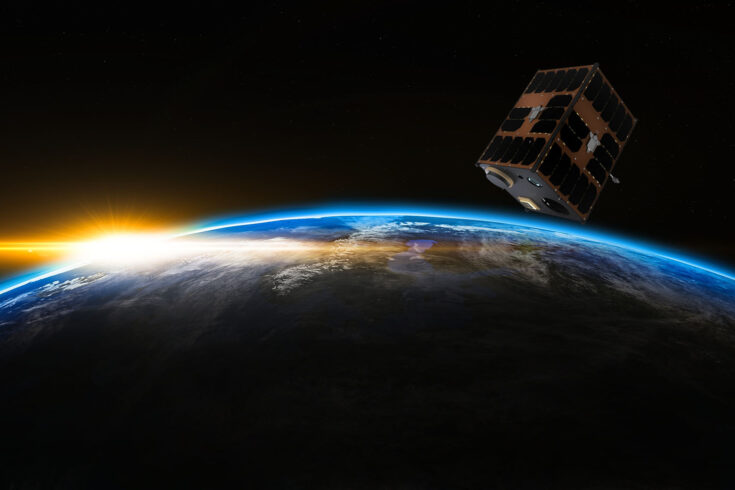Science and Technology Facilities Council
|
|
Quantum encryption spacecraft closer to launch
Speqtre, an innovative secure communications cubesat, has passed a major milestone in its journey to space.

Artists impression of Speqtre. Credit: ISISPACE
The mission, which will demonstrate quantum key distribution (QKD) from space, has passed its critical design review. This means that the team can now build and test a full model of the satellite.
New and impactful technology
QKD enables a way of encrypting data communications so that it cannot be hacked, even by future quantum computers. UK leadership in this area will help to open access to a global market thought to be worth up to US$15 billion (£11.5 billion) over the next ten years.
Speqtre is being developed by the Science and Technology Facilities Council’s RAL Space in the UK and SpeQtral, a quantum communications company in Singapore. The satellite platform is being designed and supplied by ISISPACE in the Netherlands.
A template for future space projects
Andy Vick, Disruptive Space Technology lead at RAL Space and UK Principal Investigator for Speqtre said:
Speqtre is taking a new and agile approach to developing space hardware which is scary to this very risk averse industry. This review was an opportunity to get an unbiased view of our approach from a team of experts.
I’m delighted that we have passed this critical milestone and developing Speqtre is proving to be cheaper and faster than traditional space projects.
This is an extremely exciting mission, both because it will demonstrate impactful new technology but also because of the way we are developing it. This is a template for future space projects to help us bring innovative ideas to fruition more quickly.
Cybersecurity for the future
Transferring quantum keys via satellites will enable governments and companies to secure information transfers over the internet, including for backbone networks, critical infrastructure and financial institutions, over globe-spanning distances.
This global coverage is difficult and costly to achieve with ground-based fibre infrastructure.
The technology to transfer quantum keys on the ground is relatively mature. But it is more challenging to make it small and robust enough to work in the harsh conditions in space and provide a reliable signal back to the ground.
Speqtre will test this technology, qualifying it for use in space and helping to get it ready to be used more widely by commercial operators.
Singapore and the UK
The UK and Singapore are bringing together their expertise in space technologies. RAL Space are leading the mission with overview of the space components and are also delivering the optical payload which will beam QKD signals to Earth. SpeQtral are providing the QKD hardware.
In a radically different approach from traditional space missions, the Speqtre team are bringing together off-the-shelf products with brand new technology through an experimental development process. This will enable this state-of-the-art mission to get from the drawing board and into the orbit more quickly and at a lower cost than comparable missions.
The UK Department of Business Energy and Industrial Strategy is investing £5 million in the project.
The UK government is supporting quantum projects, including Speqtre, as part of the National Quantum Technologies Programme.
This is designed to accelerate the translation of quantum technologies into the UK marketplace. This will open opportunities for British businesses to unlock new capabilities that can make a real difference to our everyday lives.
Next steps to launch
The mission is due to launch in 2024 and will test distribution of quantum keys to both:
- a ground station run by RAL Space at the Chilbolton Observatory in Hampshire
- a ground station in Singapore.
Following the successful completion of the critical design review, the teams will build the first model of the satellite and put it through initial engineering tests.
RAL Space are developing the optical ground station at Chilbolton Observatory which will be used by Speqtre and to track and communicate with a range of other satellites.
The Speqtre mission is being complemented by a similar mission, also with RAL Space involvement, led by the Quantum Communications Hub by the University of York. This spacecraft will demonstrate UK-developed quantum key distribution technologies.
Original article link: https://www.ukri.org/news/quantum-encryption-spacecraft-closer-to-launch/


+FINAL.gif)